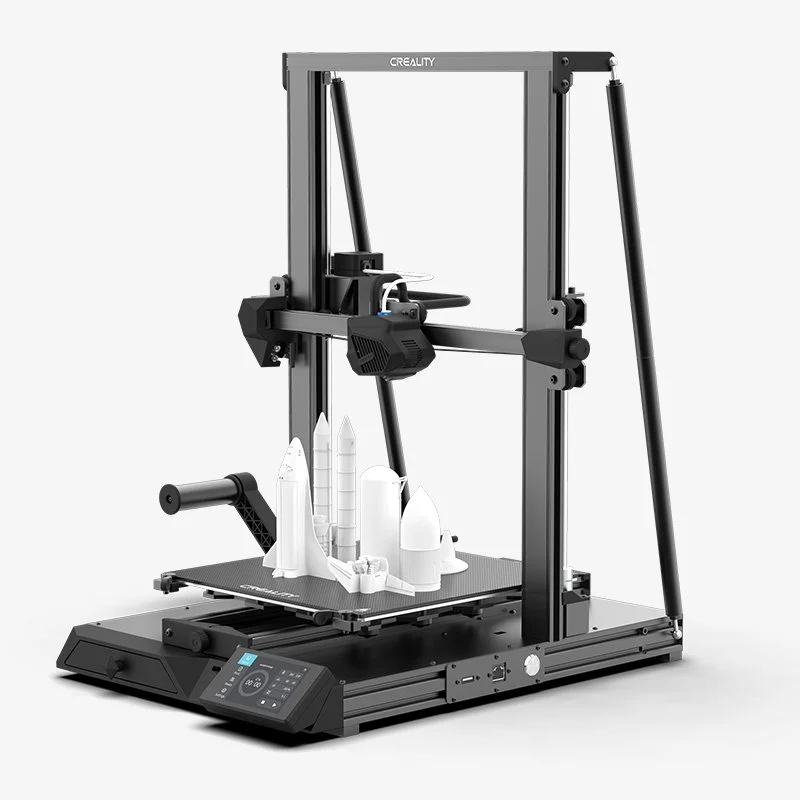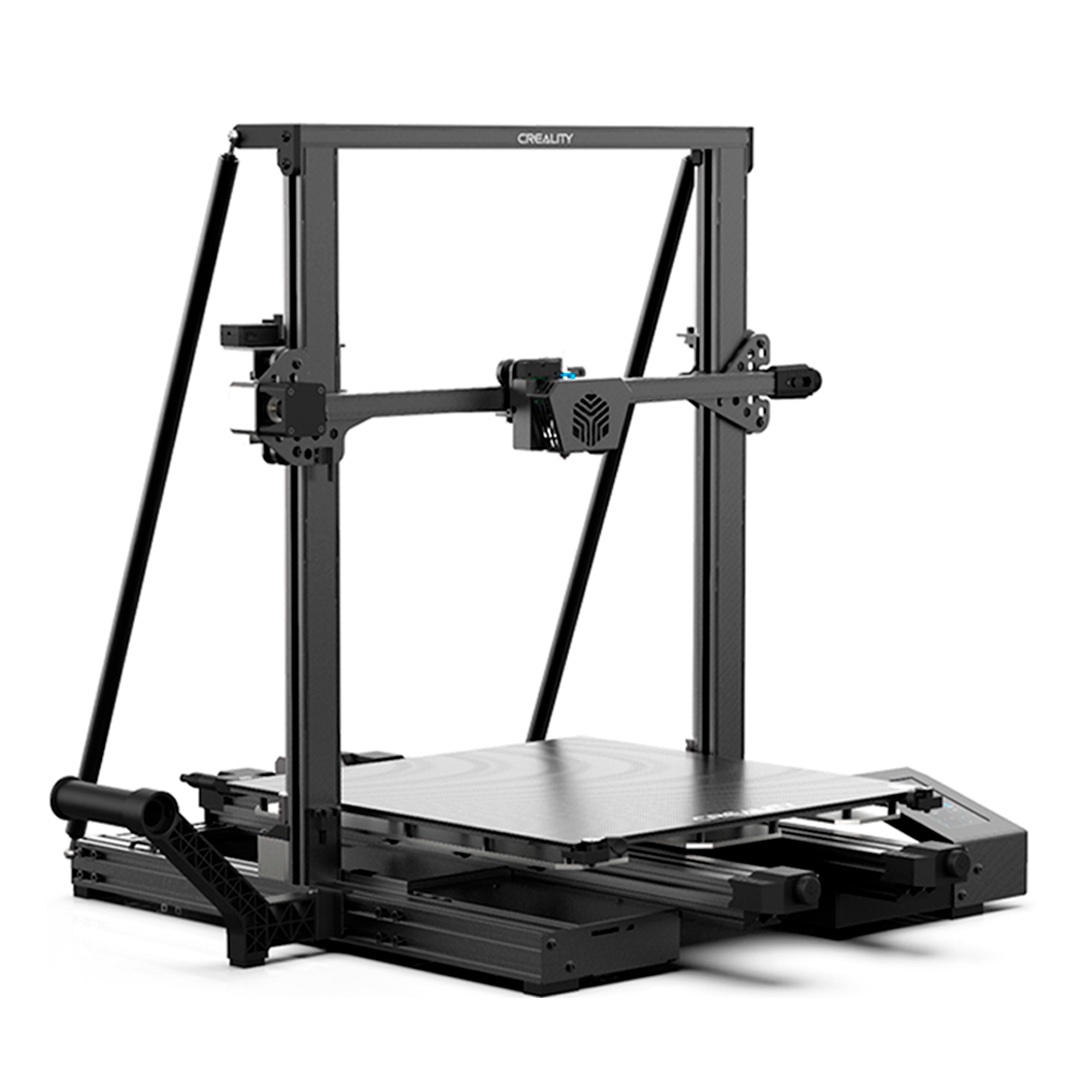Compare CR 10 Smart vs CR 6 Max
Comparison between the best 3D printers
Choose the best 3D printer at the best price. The cheapest 3D printers are here.
Buy a 3D printer here with 3D Fila.
 |
 |
|
| Model | CR 10 Smart[BUY CR 10 Smart] |
CR 6 Max |
| Printing Material | Filament | Filament |
| Buy Filament for Creality 3D CR 10 Smart | Buy Filament forCreality 3D CR 6 Max | |
| Estimated price | $520,00 | $700,00 |
| Manufacturer | Creality 3D | Creality 3D |
| Release Year | 2021 | 2021 |
| Print Volume [mm] | 300x300x400 | 400x400x400 |
| Printer Size [mm] | 578x522x648 | 725x640x691 |
| Weight [kg] | 14 | 14 |
| Power Loss Recovery | YES | YES |
| Enclosed printer | NO | NO |
| Bed Leveling | Automatic | Automatic |
| Filament End Sensor | YES | YES |
| Bed type | Heated | Heated |
| Power supply system | Bowden | Bowden |
| Standard nozzle | 0,4 | 0,4 |
| Maximum Nozzle Temperature [°C] | 260 | 260 |
| Maximum Bed Temperature [°C] | 100 | 90 |
| Maximum printing speed [mm/s] | 200 | 100 |
| Filament holder | YES | YES |
| Camera for supervision | NO | NO |
| Recommended filaments | PLA, PETG, Tritan, Flex, ABS | PLA, PETG |
| Recommended slicers | Cura, Simplify, Slic3r, IdeaMaker | Cura, Simplify, Slic3r, IdeaMaker |
| Maximum Resolution [mm] | 0,1 | 0,1 |
| Processor | Processador ARM STM32F103 RET6 CPU | |
| Display | Display touchscreen 4,3'' | Display touchscreen 4,3'' |
| Power Supply | 110/220V / 350W | 110/220V / 500W |
| Connectivity | SD / USB / Wi-Fi | SD / USB |
| Operating systems | Windows, Mac, Linux | Windows, Mac, Linux |
| Date of registration in the system | 2022-11-04 | 2022-11-04 |
| Release date | 2021 | 2021 |
| Extra features | The Creality CR-10 Smart stands out for its stability, with a dual Z axis and additional supports, minimizing oscillation in high prints. Its redesigned hotend offers better cooling, expanding the range of usable materials. The glass printing surface, with automatic leveling, facilitates the adhesion and removal of parts. Includes Wi-Fi / LAN connection and automatic shutdown after printing, adding convenience and efficiency. It features an effective single-gear extruder and an intuitive touchscreen interface, despite some firmware issues. | Crealitys CR-6 Max printer offers a large 400 x 400 x 400mm build area, perfect for larger projects without dividers. Its auto-leveling system and force sensor simplify setup. It has a 4.3-inch touchscreen and convenient features like a tool drawer and filament holder. Plus, its modular hotend, redesigned extruder, and silicon carbide-coated build plate improve print quality. |
| Support for multiple colors and materials (AMS and CFS) | NO | NO |
Notes * |
||
| Cost-benefit | 6 / 10 | 6 / 10 |
| Hardware | 2.4 / 10 | 2.4 / 10 |
| Tela | . | . |
| Print volume | 4 / 10 | 4 / 10 |
| Performance | 1 / 10 | 1 / 10 |
| [BUY CR 10 Smart] |
Conclusion |
| In comparing the Creality CR-10 Smart and the CR-6 Max, a few key points emerge that can help potential buyers make an informed decision. The CR-10 Smart is priced more affordably, making it an attractive option for those seeking a balance between quality and budget. It offers solid features such as automatic bed leveling, a heated bed, and a reasonable print volume of 300x300x400 mm. The dual Z-axis design enhances stability during prints, and its effective cooling system broadens the range of compatible materials. The added convenience of Wi-Fi connectivity and a glass surface for better adhesion are also noteworthy advantages. On the other hand, the CR-6 Max, while more expensive, boasts a larger print volume of 400x400x400 mm, catering to users with more substantial projects. It also features an intuitive interface and strong build quality, supported by its modular hotend and innovative extruder design. However, its print speed and maximum bed temperature are slightly less impressive than those of the CR-10 Smart. Ultimately, the choice comes down to specific needs: If price and efficient operation for medium-sized prints is the priority, the CR-10 Smart is likely the better option. However, if a larger print volume and additional design enhancements are more critical, the CR-6 Max can justify its higher price point. Both printers feature automatic leveling and are designed to handle a variety of filaments, making them both solid choices in the 3D printing market. |

